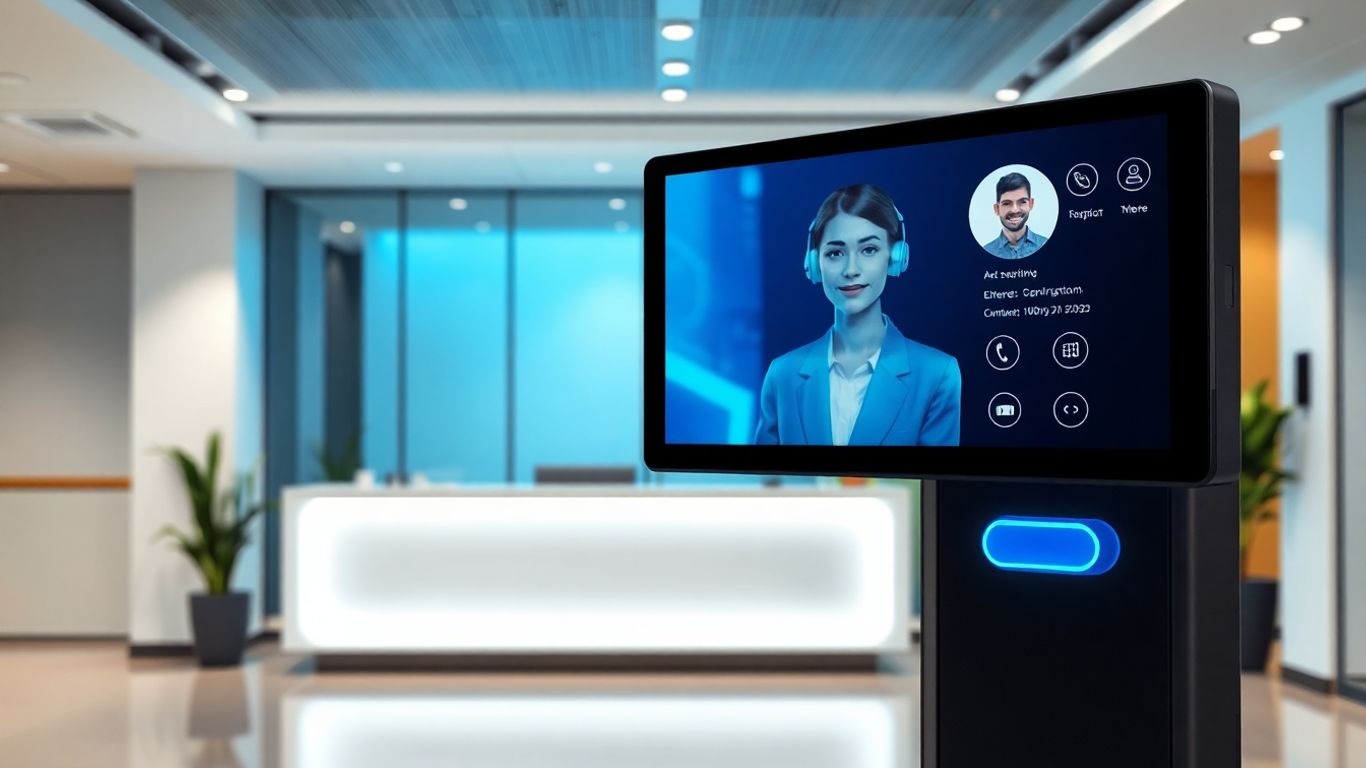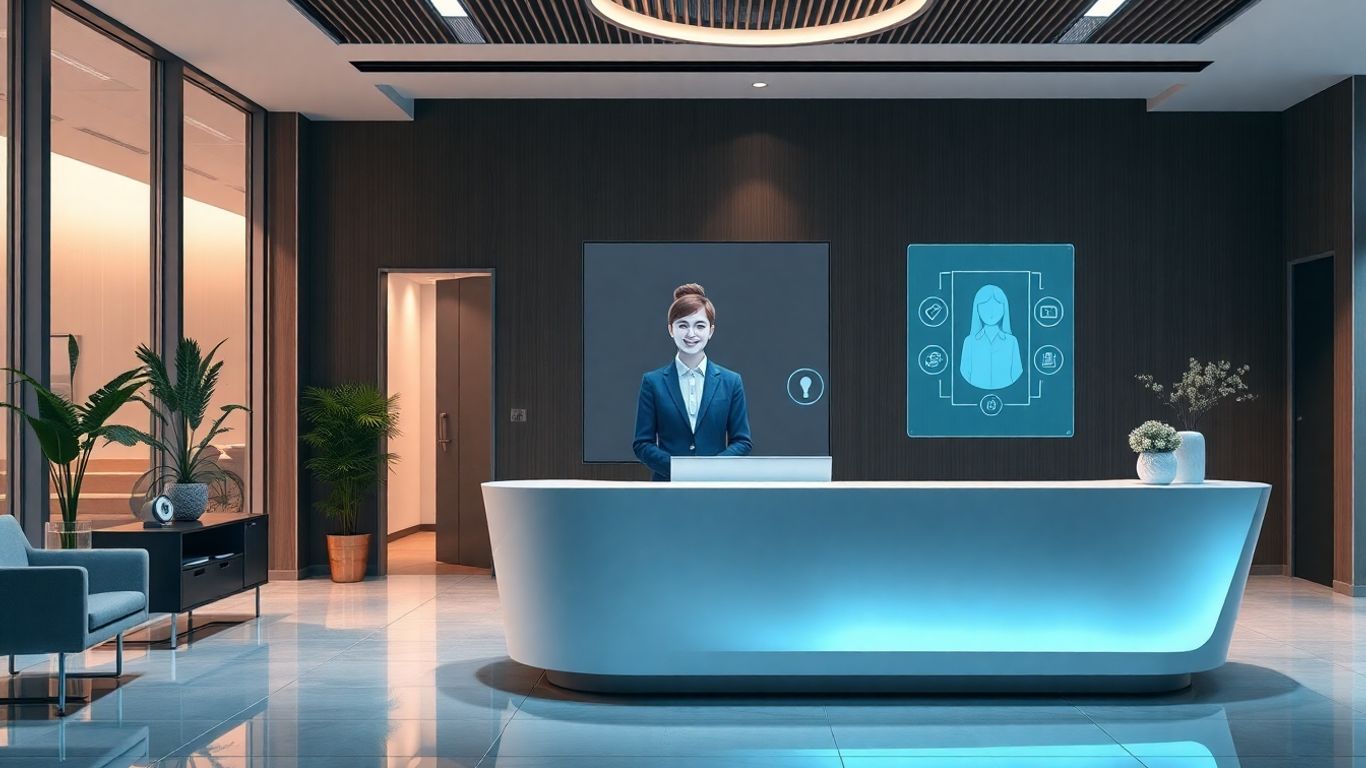In 2025, keeping up with customer calls can feel like a full-time job on top of your actual job. That's where AI virtual receptionists step in. These smart tools can answer phones, book meetings, and grab new leads, giving you back precious time. But with so many options, picking the right one can be tricky. We've looked at some of the top AI virtual receptionist live transfer solutions to help you find the best fit for your business communication.
My AI Front Desk is a pretty neat option if you're running a small business and want to stop missing calls. It basically acts like a 24/7 receptionist, handling things like scheduling appointments and answering customer questions over the phone or through text. It's designed to be super easy to set up, often taking just a few minutes to get going. You tell it about your business, and it's ready to start fielding calls.
One of the cool things is how customizable it is. They offer a bunch of different AI voices, so you can pick one that fits your brand's vibe. Plus, it can do more than just answer basic questions; it can actually learn and handle more complex inquiries based on the information you give it. This means it can be a real help in qualifying leads or providing detailed answers without you having to lift a finger.
Here's a quick rundown of what it can do:
The goal is to make sure no call goes unanswered, which is a big deal for any business trying to grow. It's about keeping things running smoothly and making sure you're always presenting a professional image, even when you're not available.
They also offer integrations with a ton of other apps, which is a big plus. This means the information your AI receptionist gathers can flow directly into your existing systems, like your CRM. It's a way to automate more of your workflow and keep everything in sync. You can even try it out for free for 7 days to see if it's a good fit for your business. It's a solid choice for businesses looking to improve their customer service without breaking the bank. You can find more details on how services like My AI Front Desk can assist with these tasks.
RingCentral's AI Receptionist solution is built right into their communication platform, which is pretty neat. It means your calls, messages, and video chats all work together. What's different here is how the AI learns. Instead of just reading from a script that gets old fast, RingCentral's AI pulls information from your website, FAQs, and other documents on the fly. This makes the conversations feel more natural, which is a big plus.
They offer an add-on called "AI Receptionist Everywhere" that starts around $50 a month for 100 minutes. This includes setup help, support, and it can handle routine calls. If you need more minutes or advanced features, you'll likely have to talk to their sales team.
Here are some of the things it can do:
One of the standout features is its dynamic knowledge integration, pulling real-time info from your business's online resources. This avoids the robotic feel of static scripts. Plus, the whole system is designed for enterprise-level reliability, meaning it's built to be up and running almost all the time. However, the pricing can get a bit complicated with different tiers and add-ons, and getting the hang of all its features might take some time if you're looking for something super simple to start with. It's a powerful tool, especially for larger businesses that need a lot of communication features all in one place.

Smith.ai is a bit of a hybrid, which can be a good thing depending on what you're after. They combine AI with actual human receptionists, all based in North America. This means you get the speed of AI for basic stuff, but if things get complicated, a real person can step in. It's a nice safety net, I guess.
What's interesting is their AI can do things like transcribe calls and give you summaries. So, you can actually go back and see what customers were saying, which is pretty neat for understanding your business better. They also handle things like lead screening and setting up appointments.
Here's a quick look at what they offer:
Smith.ai uses a per-call pricing model, which can be good if your calls are usually short. However, if you have longer conversations, it might add up faster than other services. They also focus mainly on phone calls, so if you need chat or email support handled by the same system, you'll need something else.
While their AI features are solid for basic tasks and offer unique insights through call summaries, the real human backup, while professional, comes at a higher price point. It's a trade-off between advanced AI features and the cost of human interaction.
For businesses that want that human touch when needed but also appreciate AI's efficiency for routine tasks, Smith.ai is definitely worth a look. They've handled a lot of calls, so they've got some experience under their belt, and you can check out their customer sentiment to see what others think.

GoTo Connect offers a unified communications platform that includes AI-powered receptionist features, aiming for simplicity and reliability. It's particularly suited for growing businesses, especially those with remote or hybrid teams, thanks to its mobile-first design. This allows users to manage AI receptionist settings and check performance from anywhere.
What really sets GoTo Connect apart is its integrated AI ecosystem. You get call transcriptions, meeting summaries, and even sentiment analysis all within one place. The AI Receptionist itself is available 24/7, with customizable voice options and support for over ten languages. Plus, you get instant reports and insights to help you fine-tune how it works.
To use the AI Receptionist, you'll need one of their unified communications plans. They have a "Phone System" plan that covers voice calls, texting, team chat, and video conferencing. Then there's the "Customer Engagement" plan, which adds web chat and a shared inbox. GoTo Connect doesn't publicly share pricing for these plans, so you'll need to contact them directly for details.
Key features include:
While GoTo Connect provides a robust suite of communication tools, the lack of publicly available pricing for its AI Receptionist add-on might be a hurdle for some businesses looking to quickly compare costs.
GoTo Connect's strength lies in its comprehensive approach, bundling various communication tools with AI capabilities into a single, manageable platform.
Synthflow AI Receptionist really stands out because of its focus on making conversations sound as natural as possible. They've got this voice cloning tech that's pretty neat. You can actually have the AI use your own voice, or create a custom brand voice. This means your business can keep a consistent sound across all customer interactions, which is a big deal for branding.
They're all about advanced conversational AI, meaning the system can handle more complex back-and-forth chats than some of the simpler bots out there. Plus, their API-first approach means they're built for integration, which is great if you're a bit more tech-savvy and want to connect it deeply with your existing systems.
Here’s a quick look at what makes Synthflow tick:
The ability to mimic human speech patterns and tone is a significant step forward. It moves beyond just understanding keywords to grasping the sentiment and context of a conversation, making the customer experience feel more personal and less automated. This can really make a difference in how customers perceive your brand.
While they offer plans starting from $29 per month, going up to $1,250, it's clear they're targeting businesses that want cutting-edge AI and are willing to invest in that level of customization and advanced capability. If you're looking for something that goes beyond basic call answering and really aims for a human-like conversational experience, Synthflow is definitely one to check out.

OpenPhone Sona really tries to blend AI reception duties right into their main business phone service. It’s built around this idea of a unified inbox, which is pretty neat. Imagine all your calls, texts, voicemails, and even AI chats showing up in one spot. This makes it way easier for your team to jump in, see what’s going on, and pass conversations around without losing track. It’s a solid approach for keeping things organized.
The pricing is pretty straightforward: $49 a month gets you 50 calls, and then it’s $0.99 for each call after that. They do filter out spam and calls that are super short, under 15 seconds, so those don't count against your limit. Your call allowance resets every month, so no worries about unused minutes carrying over.
To get Sona, you need to be on one of OpenPhone’s paid plans and have admin or owner permissions. Also, you can't use Apple subscriptions for it. This setup works well if your call volume is pretty predictable, and the per-call overage charge means you know exactly what you’re paying for beyond the base rate.
Here’s a quick look at what it offers:
While Sona offers a streamlined experience, its AI features are more basic compared to some specialized AI receptionist services. You might find yourself needing to step in more often for complex customer interactions. Also, being tied to the OpenPhone platform means less flexibility if you use a different phone system.
OpenPhone Sona is a good fit for smaller businesses or remote teams that want a simple, affordable AI receptionist that works well on mobile. It’s a practical solution for managing day-to-day communications without a lot of fuss. You can check out how it integrates with other tools on OpenPhone's website.
Zoom Virtual Agent is an interesting option, especially if your business is already deep into the Zoom ecosystem. It’s not just about answering calls; this AI can actually do things, like book appointments or take service requests without a human needing to step in. What sets it apart is its focus on specific industries. Think pre-built workflows for healthcare, retail, or finance, which makes the AI feel more like it understands your business rather than just giving generic answers.
The biggest draw here is the integration with Zoom's other tools, allowing calls to transition smoothly to chat or even a Zoom meeting. This unified approach can really streamline communication.
However, it’s worth noting that this is a newer player in the AI receptionist space compared to some of the more specialized companies out there. Plus, you really need to be committed to the Zoom platform to get the most out of it. If you use a mix of different communication tools, you might find yourself needing to consolidate or look elsewhere.
Here’s a quick look at what it offers:
While Zoom Virtual Agent is built on a familiar and robust platform, its effectiveness is heavily tied to your existing Zoom infrastructure. For businesses already invested in Zoom's suite, it offers a powerful way to automate customer interactions. For others, the platform dependency might be a significant hurdle.
Pricing for Zoom Virtual Agent isn't out in the open, so you’ll need to chat with their sales team to get a quote. Expect that more advanced features or specialized industry agents might come with extra costs.
Handshake really leans into the sales side of things, which is pretty cool if that's your main goal. They've got these advanced lead scoring algorithms that are supposed to figure out who's a hot prospect and who's just browsing. It's all about making sure your sales team talks to the people most likely to buy. They also do automated follow-up sequences, so if someone doesn't buy right away, Handshake keeps the conversation going across different channels like email and text. It’s not just about phone calls with them.
Their pricing is pretty straightforward, with one main plan at $199 a month or $1999 annually. This covers 24/7 calls, lead qualification, and appointment booking. You get 600 minutes included, and then it's $25 for every additional 200 minutes. They also mention a "white-glove setup," which sounds like they'll really get things dialed in for you.
Here's a quick look at what they focus on:
One thing to keep in mind is that Handshake is really built for sales-driven businesses. If you're looking for a more general customer service receptionist that handles a wide variety of inquiries, this might be a bit too specialized. It's great for lead generation, but maybe not the best fit if your primary need is just answering general questions or handling customer support issues.
Handshake's strength lies in its ability to meticulously vet leads and automate follow-up processes, aiming to prevent potential customers from slipping through the cracks. The detailed analytics they provide can really help businesses refine their sales strategies and improve how they close deals. It’s a tool designed to boost sales performance by focusing on the quality of leads and the efficiency of the follow-up process, making sure every promising interaction is nurtured effectively. You can check out their lead generation focus to see if it aligns with your business needs.
Virtual Reception AI is a solid contender in the automated call handling space, aiming to give businesses a professional front without the overhead of a human receptionist. It's built on the idea that AI can manage routine inquiries and appointment setting effectively, freeing up your team for more complex tasks. Think of it as your always-on assistant, ready to greet callers and guide them through initial interactions.
One of the standout aspects is its ability to integrate with existing business tools. This means your AI receptionist can do more than just answer the phone; it can actually update your CRM or add appointments directly to your calendar. This kind of connectivity is what really makes these systems useful for day-to-day operations. It's not just about answering calls; it's about making sure the information from those calls gets where it needs to go within your business. You can explore how this works with services that offer Zapier integration.
Here’s a quick look at what Virtual Reception AI typically handles:
While AI receptionists are getting incredibly sophisticated, they still have limitations. For highly sensitive or emotionally charged conversations, a human touch is often irreplaceable. It's about finding the right balance for your business needs.
When you're evaluating Virtual Reception AI, consider how well it understands natural language. The goal is for callers to feel like they're talking to a real person, not a robot. This involves clear voice recognition and natural-sounding responses. The system's ability to learn and adapt over time also plays a big role in its long-term effectiveness.

V2 Turbo is presented as the next evolution in AI front desk technology, aiming to be faster and more user-friendly than previous models. It's designed to provide a smooth interaction for callers, offering instant responses much like a human receptionist would. This system can handle a variety of tasks, including answering specific company questions and managing appointments, all through phone or text communication.
Key features often highlighted include:
The core idea behind V2 Turbo seems to be about making AI receptionists feel less like a machine and more like a capable assistant. It's about cutting down on those frustrating moments when you're trying to get simple information and the AI just doesn't get it. This version aims to bridge that gap, making the interaction feel natural and productive.
This AI receptionist is built to handle a high volume of interactions without a hitch. It's positioned as a way to manage customer inquiries effectively, even during busy periods. The system is designed to be quick, with response times measured in milliseconds, which is pretty impressive when you think about how much that can impact the caller's experience. It's about keeping the conversation flowing smoothly, so people don't feel like they're talking to a slow robot. This focus on speed and natural conversation is a big deal for businesses that want to make a good impression right from the first contact. You can even check out My AI Front Desk for a similar approach to AI-powered customer service.
Discover the power of the V2 Turbo, a cutting-edge solution designed to boost your business operations. This advanced system is built to handle your calls efficiently, ensuring you never miss an important conversation. Want to see how it can transform your customer interactions? Visit our website today to learn more and get started!
So, we've looked at how AI receptionists can really change the game for small businesses. They're not just about answering phones; they're about making sure you don't miss out on leads, providing great service around the clock, and freeing up your time. While no tech is perfect, and some tricky calls still need a human touch, the benefits are pretty clear. Picking the right AI receptionist means thinking about what your business needs most – maybe it's 24/7 availability, handling lots of languages, or just getting those leads captured right away. By carefully choosing and setting up an AI receptionist, you're setting your business up for smoother operations and better customer connections in 2025 and beyond. It’s a smart move to keep your business growing.
An AI virtual receptionist is like a super helpful digital assistant for your business. It uses smart computer programs to answer your phone calls, chat with customers online, and even book appointments. Think of it as a receptionist who works 24/7, never gets tired, and can talk to many people at once, all while sounding pretty much like a real person.
These digital helpers use something called natural language processing, which means they can understand what people are saying or typing. They listen or read your customer's request, figure out what they need, and then respond in a way that makes sense. They can also connect with your other business tools, like your calendar or customer list, to get things done automatically.
You'll want to look for features like answering calls all day and night, sounding natural when they talk, being able to capture new customer leads, and setting up appointments. It's also great if they can connect with your other business software, send text messages, and even speak different languages. Some can even hand off calls to a real person if they can't handle it.
Yes, modern AI receptionists are really good at sounding like people. They use advanced technology to make their voices sound natural and speak at a normal pace. Some can even be set up to sound like your company's specific brand voice, so much so that customers might not even realize they're talking to an AI!
Good AI systems know when a question is too tricky for them. In those cases, they can smoothly transfer the call to a real person on your team. They can also pass along important information about the conversation so the human agent knows what's going on, making sure nothing gets missed.
Many AI receptionist services are designed to be easy and fast to set up. Some say you can get started in just a few minutes. You usually just need to tell the AI about your business, and it can begin handling calls right away.
Yes, they often can! Hiring a full-time human receptionist can be expensive. AI receptionists can handle many tasks for a lower cost, and they work 24/7, meaning you don't miss out on business just because it's after hours. This can lead to more customers and sales.
Absolutely. Most AI receptionist services can connect with your existing business software, like your calendar for scheduling or your customer relationship management (CRM) system to keep track of leads. This connection helps everything run more smoothly and saves you from doing extra data entry.
Start your free trial for My AI Front Desk today, it takes minutes to setup!








